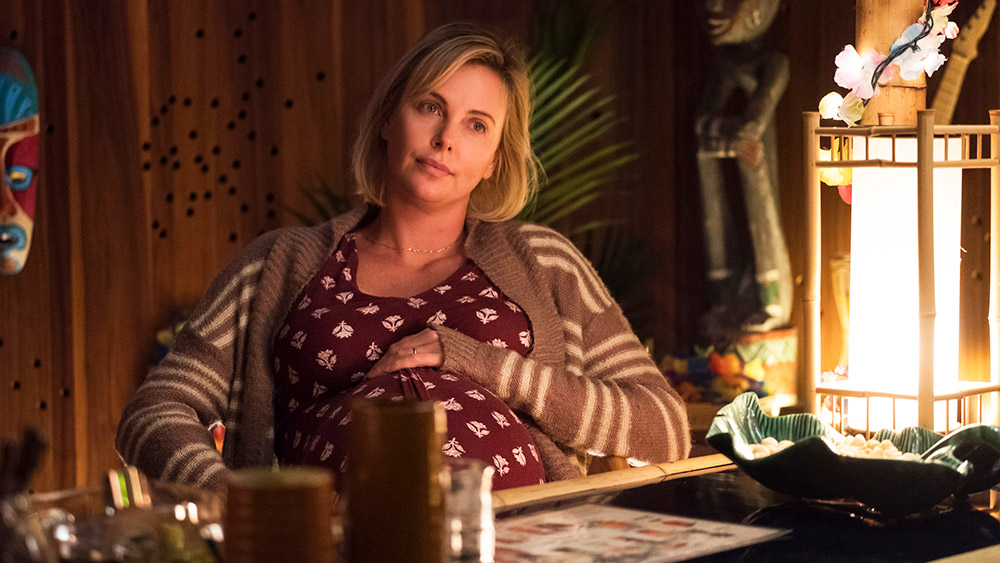Charlize Theron delivers a powerful, fearless performance showing the messy, exhausting reality of motherhood in Tully, from director Jason Reitman.
Heavily pregnant, Marlo (Charlize Theron) lives in suburbia on the outskirts of New York with her husband Drew (Ron Livingston) and their two children. We learn early on that the imminent new arrival was unplanned. Both parents, now in their forties, are anxious about their financial and physical means to cope with child number three, but feel the pressures of society not to question the miracle of childbirth. With her due date looming, Marlo has started maternity leave but there is no time for relaxation as she struggles with her five year old son, Jonah’s behaviour. Although he has not been officially diagnosed, he displays all the signs of autism, causing him to act out not only at home but also at kindergarten. They’re regularly called in to meet with the headmistress to discuss options and additional support, at their own expense, to deal with Jonah’s ‘quirky’ nature. Drew believes that he is fulfilling his role as a father, dutifully helping with the children’s homework and lunches; but he is largely absorbed in his demanding career and distracted by videogames.
Marlo’s wealthy older brother Craig (Mark Duplass) can see his sister is overburdened and unrecognisable as her former self, so he offers to pay for a night nanny who will care for the baby so she can regulate her sleep. Stubbornly independent, Marlo rejects the gift with her usual wit and sarcasm, perceiving it as an upper-class indulgence befitting her Pilates-loving sister-in-law (Elaine Tan). However, a few weeks after the arrival of new daughter Mia and over the course of a brilliantly constructed montage of nappy changing, breast-feeding and sleepless nights, she relents.
Coming to Marlo’s rescue is millennial Mary Poppins, Tully (Mackenzie Davis) – a free-spirited 26 year old with an abundance of energy, unrestrained honesty and optimistic reflections that contrast with Marlo’s world-weary perspective. Tully’s nurturing nature extends beyond her care of Mia, as she cleans the home, bakes cupcakes and applies her deeply knowing, albeit naïve brand of philosophy to Marlo. The pair become close confidants and while a predictable outcome, it is credibly constructed. With her new support, Marlo’s former vibrant self emerges from the fog of sleep deprivation and exhaustion. While Tully’s presence is a salvation to the monotony of early motherhood, it also serves as a reminder of the care-free self that Marlo left behind for a family life. It starts Marlo questioning if the act of giving life has drained her own life.

Theron’s performance is emotionally raw and physically intense, as she flips from warm and loving to unfiltered anger with her character on the verge of a breakdown due to pure exhaustion. It is reminiscent of the stellar performance that won her an Academy Award for Monster (2003) and is deservedly receiving similar critical praise. There is no glamorisation of motherhood here as she is desperately trying to do her best to deal with the physical and emotional demands of simply getting through each day. Theron put on roughly 20 kilograms for the role and it is on full display with the stretch marks and saggy, leaky boobs. This adds a layer of authenticity to the role, both when she is a full-term pregnant woman and a new mother. It is a refreshing alternative to an actress wearing a prosthetic suit who miraculously returns to a size zero immediately after childbirth. At one point her character describes feeling like ‘an abandoned trash barge’, which is a stark contrast to Tully’s breezy arrival. Mackenzie Davis is radiant in her role of Tully and perfectly captures the informed-about-everything manner of a typical millennial.
Tully is the third collaboration between director Jason Reitman and award winning scriptwriter Diablo Cody, following Juno (2007) and Young Adult (2011). Together they have created a perceptive and moving tale about the unspoken anguish of motherhood, delivered with wit and refreshing honesty. Cody demonstrates her excellent ear for dialogue, seamlessly entwining her trademark witty one-liners with poignant insight. Her characters are unfiltered, making them easy to empathise with and their struggles heartwarmingly real.
Tully is a breath of fresh air and realism in a world where pregnant women are described as glowing and motherhood is painted as a blessing of daily, life fulfilling miracles. It is the film’s emotional complexity and humour which, like motherhood itself, is so rewarding.
Fun Fact:
The film has been subject to some controversy surrounding its depiction of postnatal (or postpartum) depression and other mental illness. Those that take issue with the portrayal of these subjects do so because the conditions are never specifically named and because they feel that there isn’t enough treatment shown on-screen. Those that champion the film feel that it is more accurate for not naming the condition, since postnatal (or postpartum) depression is severely under-diagnosed, and that the film actually does a service by causing debate about these under-discussed topics.




COMMENTS